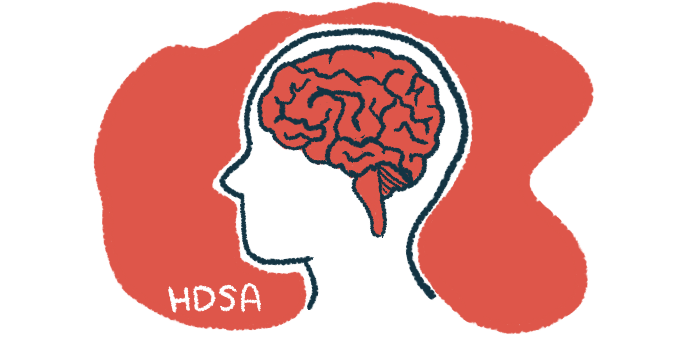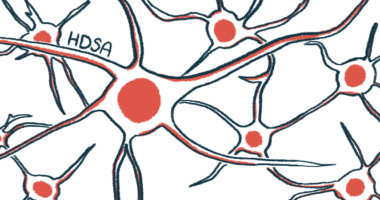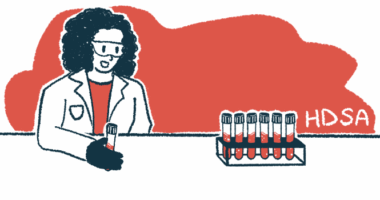HDSA 2024: Study cites need for family psychological support
‘Until there is a cure, there is care,’ researcher says

There’s a sore need to provide more psychological support to people living with Huntington’s disease and their families, not only around the time of testing and potential diagnosis, but throughout the different stages of the disease, according to a study released at the 2024 Huntington’s Disease Society of America (HDSA) convention.
“What the research tells us is actually that in terms of quality of life, people with HD [Huntington’s disease] are more affected by psychological and cognitive problems than motor symptoms,” said Nicolo Zarotti, PhD, who conducted the study along with colleagues in Italy. That mirrors the experiences of people with other neurodegenerative disorders like Parkinson’s disease, he said.
Zarotti, clinical psychologist at the Manchester Centre for Clinical Neurosciences and honorary clinical lecturer at Lancaster University, described the findings in a presentation, “Accessing Psychological Support for Huntington’s Disease: The Importance of Patients’ and Caregivers’ Experiences,” at the HDSA convention, held May 30-June 1 in Spokane, Washington.
Huntington’s is a genetic neurodegenerative disorder with symptoms including movement problems as well as psychological and psychosocial difficulties such as depression, anxiety, aggressiveness, shame, social disability, and isolation.
Despite the known impact of mental health in Huntington’s, there’s minimal evidence to inform guidelines about this type of care. To provide the best support possible, Zarotti said, it’s crucial that clinicians and scientists look to patients and family members to lead the way. “Until there is a cure, there is care,” he told the audience. “And we need to inform care based on your experience … because you know better than anyone else what having HD in a family feels like.”
HDSA convention presentation resonates with participants
While psychological symptoms like anger or depression can be a result of brain changes that occur due to Huntington’s, they can also be a completely understandable response to a diagnosis, Zarotti said. “Having HD sucks,” he said.
Zarotti presented findings from a qualitative study he and colleagues conducted with the goal of better understanding experiences of psychological support among Huntington’s patients and caregivers. He then opened up the discussion to attendees in the room at Spokane, who offered their own experiences.
The study involved interviews with seven people with early-stage Huntington’s and their caregivers. The researchers conducted a thematic analysis, looking for common narratives that emerged during the interviews.
Findings suggested that, for patients as well as family members, psychological support was often inadequate, inaccessible, or, in some cases, lacking entirely.
The researchers highlighted a lack of support for people undergoing the emotionally taxing process of deciding to get tested and then finding out whether or not they carry the genetic mutation that causes Huntington’s.
Patients described clinicians giving them “the unvarnished truth” and telling them to get on with their lives, with little to no acknowledgement of the fact that learning one has Huntington’s disease is, as one patient put it, “absolutely terrifying.”
The findings rang true among the crowd in Spokane, many of whom spoke up to share how the process of getting diagnosed was made unnecessarily turbulent by callous or thoughtless communication from providers.
A woman recalled a neurologist delivering a Huntington’s diagnosis to her husband while “eating potato chips.” Another patient never even heard from a doctor, with his wife finding out his test was positive only by checking an online patient portal. “I had to go home and tell my husband and our children,” the patient’s wife said, adding that after five years, they still haven’t “heard from them.”
Many people have qualms about seeking mental health support, Zarotti said. Men in particular, he said, sometimes find that the idea of seeing a therapist challenges their view of their own masculinity.
Cost and travel logistics can also be major barriers to seeking out mental healthcare, especially for families dealing with the impacts of a chronic illness like Huntington’s.
And even when people with Huntington’s do seek out help, they’re often met with a “staggering lack of knowledge about HD” from mental health professionals, Zarotti said.
One patient interviewed in the qualitative study recalled seeing a therapist who said they’d “heard about [Huntington’s] once.” The patient decided to leave.
Advocacy groups step up
Although clinicians may drop the ball on providing Huntington’s-specific psychological support, Zarotti said patient advocacy groups such as HDSA are stepping up in a big way.
HDSA offers a helpline, available by calling 800-345-HDSA (4372) for assistance in finding local resources, as well as a free telehealth program that can connect people affected by Huntington’s to counselors who are knowledgeable about the condition. Psychological support is also a key component of multidisciplinary care provided at the more than 50 HDSA centers of excellence across the country.
Zarotti said there are major unmet needs for specialized support to help people navigate the emotional and psychological hurdles of a Huntington’s diagnosis. He stressed that this type of support needs to be ongoing, continuously evolving, and adapting as the disease progresses.
“We know that HD is a condition where needs can dramatically change from one week to the next,” he said. “So there should be constant support across all the stages of the condition.”
Zarotti also emphasized that psychological support programs can’t just focus on the person with Huntington’s. It’s also key to provide support to family members, including children, he said.
“HD has a massive impact on the family system,” Zarotti said. “Everyone who is affected by HD needs support,” including caregivers, though some may not seek it out, he said. “Some people just soldier on and take everything on their shoulders,” Zarotti said. “But how can you care for someone if you’re not in a position to be able to care for yourself in the first place?”
Note: The Huntington’s Disease News Today team is providing virtual coverage of the Annual Huntington’s Disease Society of America Convention (HDSA) May 30-June 1. Go here to see the latest stories from the conference.







